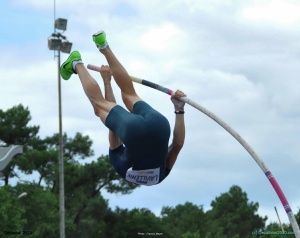Psychoathlon! (0)

Multievents in the 21th century. Part III
Doesn’t exist, you think? It’s Japanese for what we know as double decathlon or Icosathlon. Probably many people in Japan as well as (let us be honest) many people in other countries think that, whatever – if you are a man or a woman - you must be a little bit crazy to participate in a decathlon let alone Icosathlon.
IAUM
IAUM is the governing body of the International Association for Ultra Multi events founded in 2003. It organizes multi events and develops rules for them, as well as it promotes this events in the whole world. Athletes of 29 country’s took part in the since 1981 IAUM-organized multi events. Most important events are men - Icosathlon (20) and Tetradecathlon (14) for women. Scoring tables are the same of the IAAF tables for each of the eleven events from the Decathlon (10) and the outdoors Pentathlon (1 extra = 200m). For the other nine events, there are special IAUM scoring tables. The Icosathlon is contested over two days and an extra rule is for example that each day contains a pause of one hour at least after five events. You also have to start at the conclusion in the 10.000. Rules for the different events are the same as those from the IAAF. World record holder is Joseph (Joe) Detmer with 14.571 points (2010). A one day Icosathlon exists as well. David O’Toole made a 10.615 score in one day (2005).
“Icosathlon” or “Double Decathlon”?
There are many names given to the competition. As “deca” from the Greek means ten and “Icosa” means twenty, logical thinking would be to say “Icosathlon”. A second reason is giving it his own unique and appropriate identity and third is that a double decathlon can be understood as doing two times an official decathlon, back to back. The American Dave Thoreson is the world record holder for those two successive decathlons completed in four days with 13.953 points (6770 on 6/7 may 1972 + 7183 on 8/9 may 1972).